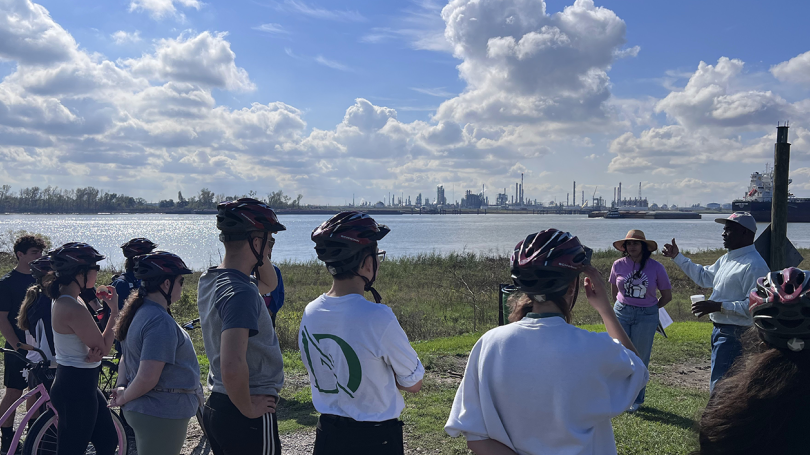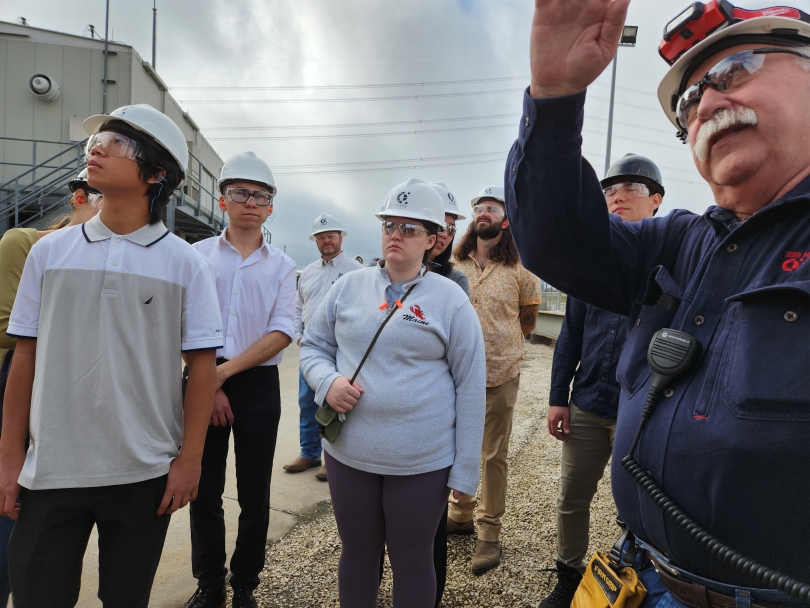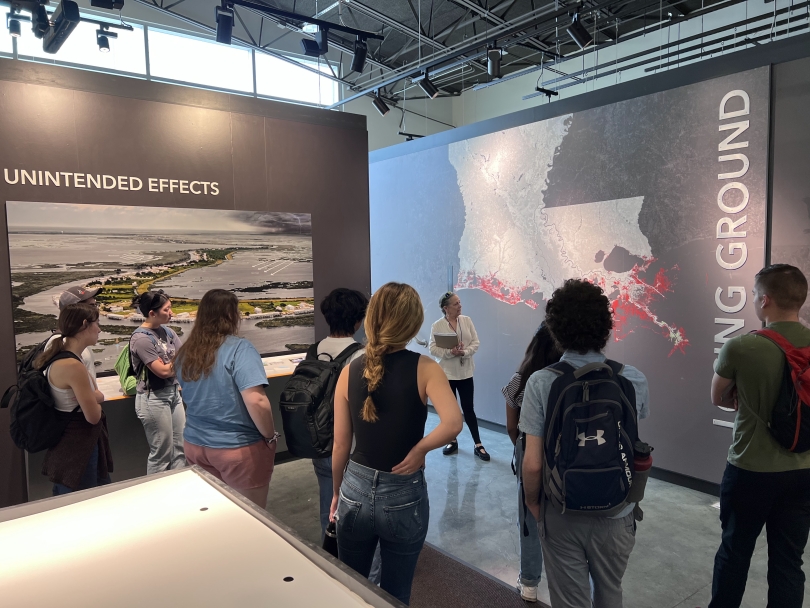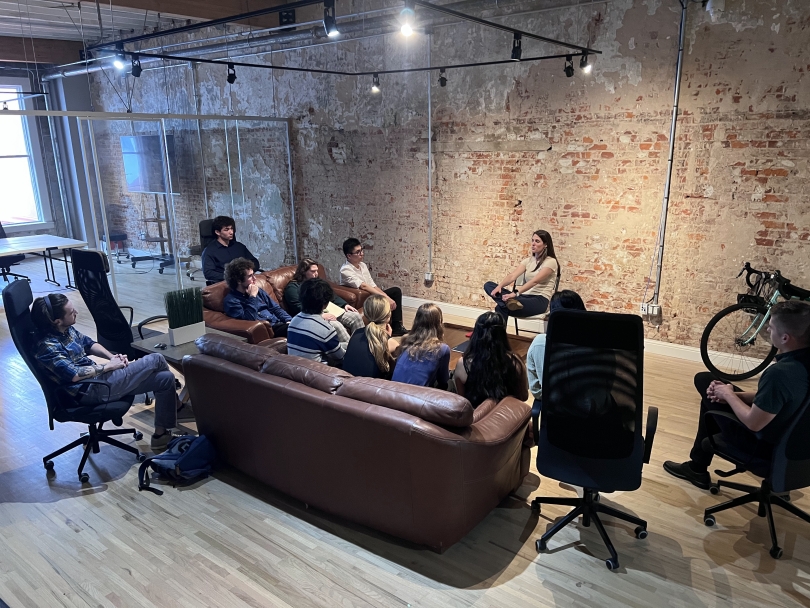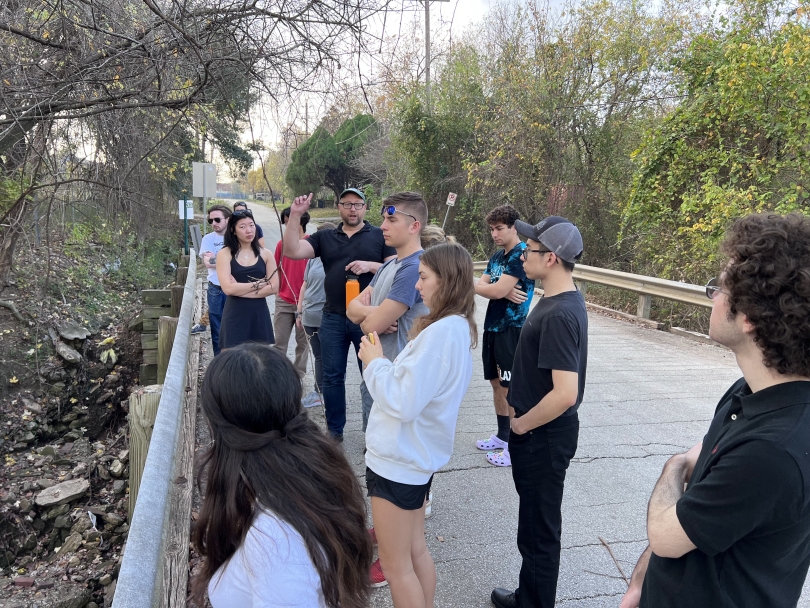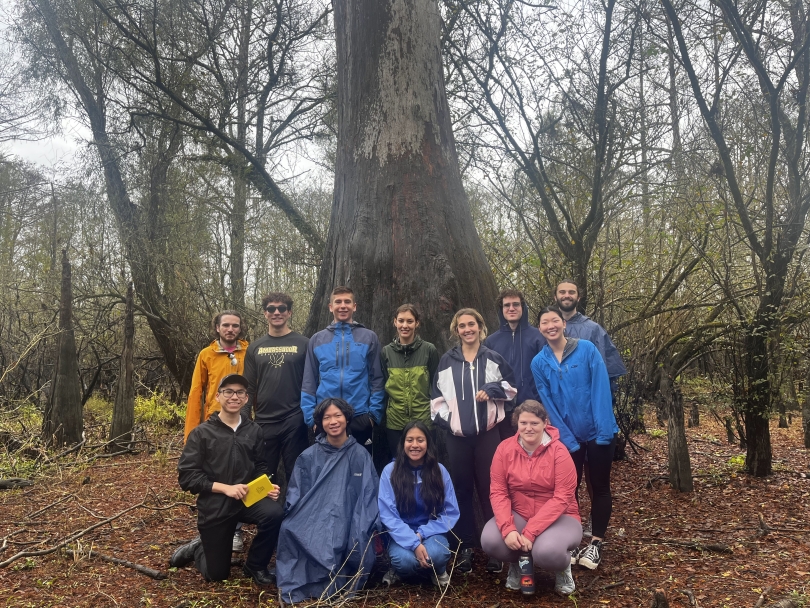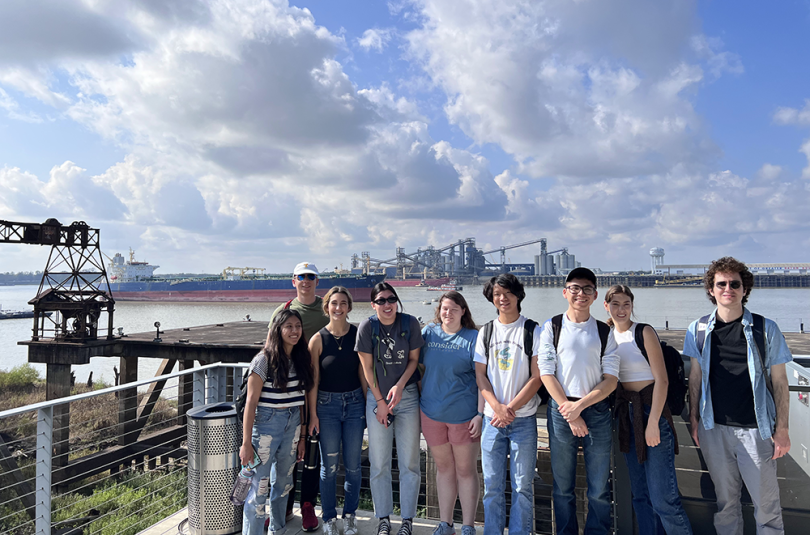The Heart of America's Energy Industry
In December 2022, after a more than three-year pandemic-related pause, twelve Dartmouth undergraduate students and several Dartmouth staff members hit the road to explore energy and society in the US Gulf Coast as part of the Arthur L. Irving Institute for Energy and Society's and Dartmouth Sustainability Office's Energy Immersion Trip program.
The Gulf Coast states of Texas and Louisiana are home to incredible ecological and cultural diversity. They are also two critical players in the US energy industry. Texas is the country's leading producer of crude oil, natural gas, wind power, and electricity, while Louisiana, due to the density of energy intensive industries such as refineries and petrochemical plants, consumes more energy per capita than any other US state. The energy industry is a major economic force in the Gulf Coast, employing large numbers of people as it supplies regional and national energy needs. At the same time, these states also absorb the environmental impacts of the energy industry on surrounding communities and ecosystems. For Dartmouth students curious about energy and society, the Gulf Coast serves as a fascinating and instructive place to dig deeply into the complex, nuanced, and often contradictory aspects of our modern energy systems.
Laying the Ground For Inquiry
The trip itself is only one piece of the energy immersion experience. After applicants are selected to participate early in term, Irving Institute and Sustainability staff and invited guest experts lead a series of preparatory sessions to help introduce the topics the students will be exploring in depth during the trip. The education sessions range from a crash course in energy concepts to a geological history of oil and gas in the region, to the impact of environmental racism, and more.
"We did our best to bring in partners from around campus and asked them to share their knowledge and help our students establish a strong foundation to build upon once we were in the field," said Dartmouth Sustainability Fellow Jackson Walker '22, who co-led the trip. "It was important for our students to have this background before we put them in front of our partners in the Gulf Coast, and these pre-trip education sessions were our way of kickstarting the collaborative learning process."
With a solid foundation in place, in early December, the group converged on Houston, Texas, for the first leg of the trip, eager to immerse themselves in energy. Each day was organized around critical themes in energy and society, from natural history and geology, to oil and gas exploration, extraction, refining, and distribution, to startups and renewable energy, to the socio-economic and ecological impacts of energy systems. During the course of the experience, students visited museums, toured energy production facilities, took boat and bike trips, and engaged in formal and informal discussions, experiencing first-hand the rich and various aspects of energy in the region.
Energy on a Human Scale
"It's a lot to pack into ten days," acknowledged Angus McReynolds, Irving Institute Experiential Learning Coordinator and trip co-leader. "But given the scope and complexity of the subject, we wanted the students to engage with as many facets of energy systems as possible."
Through interactions with a range of people, including corporate executives, facilities managers, scholars, renewable energy entrepreneurs, community activists, and artists — many of whom are Dartmouth alumni — the students were able to approach a system that can feel monolithic.
"These trips are designed to transform students' understanding of energy systems by connecting them with the people who make up the systems," explained Rosi Kerr '97, Dartmouth Sustainability Director.
Abigail Rodgers '90, Corporate Brand Manager at ExxonMobil and Irving Institute Advisory Board member, was a critical partner in organizing the group's visits to the company's Baytown Refinery and corporate headquarters. For Rodgers, the immersion trip program is valuable in how it gives students an "appreciation for the scale and pervasiveness of the modern-day energy system. Through visits with companies in all sectors of the industry, the students are able to test their assumptions with alumni business leaders, helping them gain a fuller understanding of how energy companies operate, plan for the future, and approach the challenges and opportunities of a changing energy landscape."
Kerr, who joined the group in Houston, remarked on how impressed she was with how local hosts and partners encouraged students to ask questions. This sentiment was seconded by one participant, who observed, "instead of it being a one-way exchange where we as students listened, we were going back and forth in a two-way exchange."
Questions and Ideas
The experience provoked new questions and ideas for students, complicated their understanding of the issues, and informed how they think about their own futures in the energy space.
For one participant, a day in the Atchafalaya Basin in Louisiana highlighted the challenges of securing economic and environmental health. "The balance they're trying to strike between preserving their swamplands and also keeping people employed… seems to be the issue with a lot of different places, and it made me wonder how we're going to complete an energy transition while also making sure communities are economically stable."
Another wrote that the experience went beyond just learning about energy systems. "From what it takes to tackle 'wicked problems' that at times seem impossible to resolve to what it takes to be a leader, this trip was truly a transformative experience. I loved this trip. I would have never truly understood petroculture if I didn't see it first-hand."
For others, the program opened up new ideas about the future. "This trip definitely pushed me towards considering a career in energy. … I believe that energy will continue to emerge as a field of great importance, and so I hope to utilize the resources at Dartmouth to continue exploring this topic further."
Purposeful Optimism
Ultimately, program organizers hope that students return from the trip with a sense of purpose and optimism. "Rather than being stuck in a kind of 'black or white' framing of our energy systems, which can be overwhelming, discouraging, and a difficult place from which to make real progress, we want students to come away from this experience feeling connected to solutions," explained Irving Institute Executive Director April Salas.
For one student, who recalled a moment of reflection in Baton Rouge, this sense of purpose and optimism was strong. While thinking about the environmental and social injustices the group had learned about during the trip, the student noted, "I also thought about how so much change had occurred in the lifetimes of the speakers we spoke to. How in the grand scheme of things, these systems were only built recently. In the end, while looking at the reflection of the sky on the water, I had somewhat of a lightbulb moment where I saw my role in all of this. I and the peers around me were soon going to be making history rather than studying it. … Knowing that we are creating the future for the generation after us puts into perspective what I am choosing to do with my career and what kind of impact I am seeking to make."
______________________________________
Many thanks to all of our local hosts and partners who helped make this trip so successful: Atchafalaya River Basinkeeper; Dr. Dominic Boyer; Calpine; Hannah Chalew; Michael Elias; ExxonMobil; Fervo Energy; Greentown Labs; Michael Hsafner '89; Thad Hill TU'95; Houston Museum of Natural Science; John Jeffers '85; Sarah Jewett '12; Louisiana Bucket Brigade; LSU Center for River Studies; Revolution Turbine Technologies; Abby Rodgers '90; Samantha Shchnee '92
